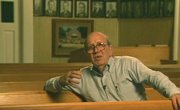This story has been updated from the original version to include funeral arrangements and additional quotes.
Rev. Will Davis Campbell, a Baptist minister, activist, author and lecturer who drew acclaim for his involvement in the Civil Rights Movement, died Monday, June 3, at age 88.
John Egerton, a close friend of Campbell's for nearly 50 years, informed the Associated Press that Campbell died in his Mt. Juliet, Tenn., home from complications following a stroke he had in May 2011.
Campbell was born in 1924 in Amite County, Miss., the son of a farmer. His local Baptist congregation ordained him as a minister when he was 17. He later attended Louisiana College, and enlisted in the Army during World War II. Afterward, he attended Wake Forest College, Tulane University and Yale Divinity School. He received a divinity degree from Yale in 1952 and moved to Taylor, La., to preach at Taylor Southern Baptist Church. He later moved to Nashville, where he began his work with the Civil Rights Movement.
In Nashville, Campbell served as a field officer for a pro-integration organization called the National Council of Churches. Because he was white, he was allowed entry into places unavailable to others at the forefront of the movement. In 1957, Campbell was one of four people who escorted the black students who integrated the Little Rock, Ark., public schools and was the only white person present when the Rev. Martin Luther King Jr. founded the Southern Christian Leadership Conference. In 1961, he helped the Congress of Racial Equality and the Student Nonviolent Coordinating Committee Freedom Riders integrate interstate bus travel despite white mob violence in Alabama.
In 1963, Campbell left the NCC to become director of the Committee of Southern Churchmen, which provided a home for his activism in subsequent years. The CSC published a journal called Katallagete, which featured articles about politics and social change. Edited by James Y. Holloway of Kentucky's Berea College, Katallagete was published from 1965 until the early 1990s. The CSC relinquished control of the journal to Campbell and Holloway in 1983.
"When we had the sit-ins, Will would show up," Bernard Lafayette, a civil rights leader in Nashville and close friend of Campbell's, said in an interview with The Tennessean newspaper. "We knew there was somebody who cared and was concerned about what happened to us. He was reminding us that there were some white people who believed in what we were doing."
"I knew [Campbell] for almost 50 years," John Egerton told the Jackson Free Press. "We were close, close friends. He helped me and scores of uncounted other people, white and black, to understand what we did to mess this country up. He understood that and helped a lot of other people understand who we need to look to and what we need to do about this as a society."
"He used to say, 'We're all bastards, but God loves us anyway.' He'd say that it's not enough just to love people who are nice to you. You have to love the people who revile, hate and threaten you, too, or you're never going to get far. That's a hard lesson to learn. I'm still learning it, but he lived it."
A Memorial service for Campbell will be held at noon Saturday, June 22nd at Saint Stephen Catholic Community (14544 Lebanon Rd., Nashville) with family visitation preceding at 11 a.m., and continuing at the church after the service. In lieu of flowers, the family has suggested that alternative donations be made to nonprofit public-service organizations such as Park Center (801 12th Ave. S., Nashville) and Second Harvest Food Bank (331 Great Circle Rd., Nashville).
More like this story
More stories by this author
- New CSET Atrium Dedication and College of Business Donation at JSU, MSU ERDC Day
- JSU Commencement Speakers, National Academy of Inventors Chapter and Marc E. Bassy at MSU
- JSU Getty Images Donation, MSU Research Week and Give Wing at USM
- Alumni Enrichment Institutes an MS Got Soul at JSU, State Science Fair at USM
- JSU Blue Tie Gala and Regions Card, MSU Virtual Reality Grant



Comments
Use the comment form below to begin a discussion about this content.
comments powered by Disqus